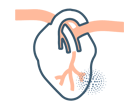Gemayel, C., Pelliccia, A., & Thompson, P. D. (2001). Arrhythmogenic right ventricular cardiomyopathy. Journal of the American College of Cardiology, 38(7), 1773–1781. https://doi.org/10.1016/s0735-1097(01)01654-0
Sen-Chowdhry, S., Lowe, M. D., Sporton, S. C., & McKenna, W. J. (2004). Arrhythmogenic right ventricular cardiomyopathy: clinical presentation, diagnosis, and management. The American journal of medicine, 117(9), 685–695. https://doi.org/10.1016/j.amjmed.2004.04.028
Hulot, J. S., Jouven, X., Empana, J. P., Frank, R., & Fontaine, G. (2004). Natural history and risk stratification of arrhythmogenic right ventricular dysplasia/cardiomyopathy. Circulation, 110(14), 1879–1884. https://doi.org/10.1161/01.CIR.0000143375.93288.82
Corrado, D., Fontaine, G., Marcus, F. I., McKenna, W. J., Nava, A., Thiene, G., & Wichter, T. (2000). Arrhythmogenic right ventricular dysplasia/cardiomyopathy: need for an international registry. Study Group on Arrhythmogenic Right Ventricular Dysplasia/Cardiomyopathy of the Working Groups on Myocardial and Pericardial Disease and Arrhythmias of the European Society of Cardiology and of the Scientific Council on Cardiomyopathies of the World Heart Federation. Circulation, 101(11), E101–E106. https://doi.org/10.1161/01.cir.101.11.e101
McKenna, W. J., Thiene, G., Nava, A., Fontaliran, F., Blomstrom-Lundqvist, C., Fontaine, G., & Camerini, F. (1994). Diagnosis of arrhythmogenic right ventricular dysplasia/cardiomyopathy. Task Force of the Working Group Myocardial and Pericardial Disease of the European Society of Cardiology and of the Scientific Council on Cardiomyopathies of the International Society and Federation of Cardiology. British heart journal, 71(3), 215–218. https://doi.org/10.1136/hrt.71.3.215





